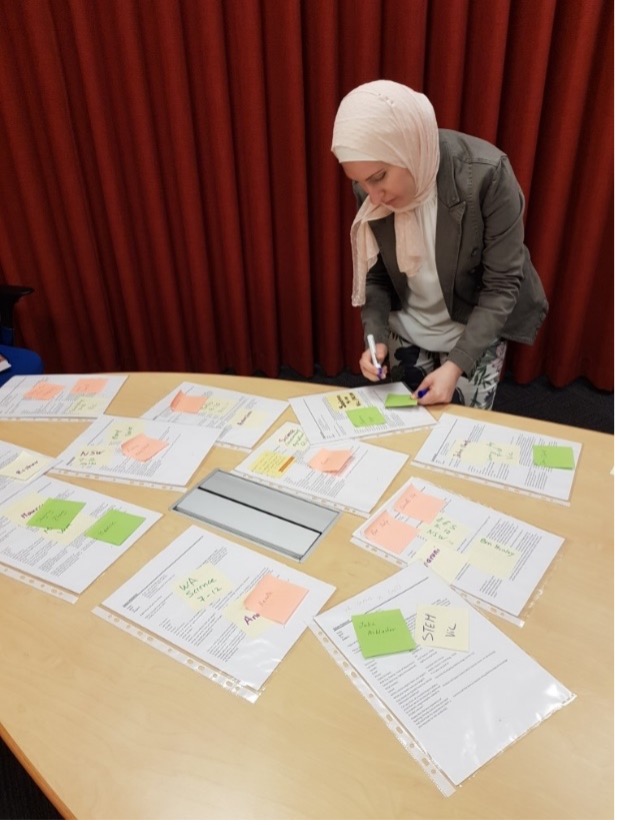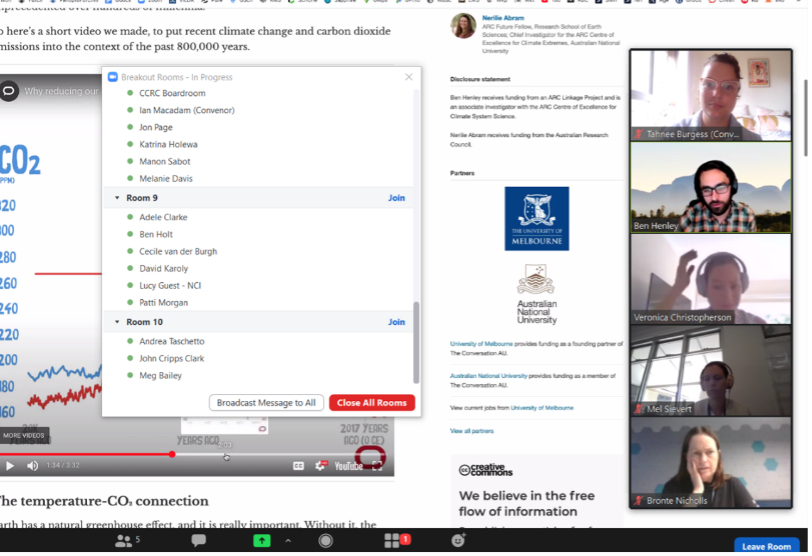by Ian Macadam and Sanaa Hobeichi
Sanaa Hobeichi and Ian Macadam of the CLEX Knowledge Brokerage team are spearheading Climate Classrooms, a joint project of CLEX and the Monash Climate Change Communication Research Hub (MCCCRH) that aims to raise the profile of climate science in secondary school Science, Technology, Engineering and Mathematics (STEM) subjects. Despite the name “climate science”, climate science often has a much lower profile in STEM subjects than some non-scientific subjects. This can lead to a misconception among students that they do not need STEM skills to pursue climate science at university and a lack of awareness among STEM students that their passions and skills can be applied to climate science, to the detriment of the field.
The approach taken by Climate Classrooms to bring climate science to the classroom relies on workshops in which school educators and climate scientists work together. Participants develop draft educational resources that use examples from climate science to address the objectives of the Australian curriculum. The CLEX-MCCCRH Climate Classrooms Team then works to develop some of the content generated by the workshop into fully-fledged teaching resources aligned to the Australian curriculum, which are made freely available here. The team also works with TROP ICSU (Trans-disciplinary Research Oriented Pedagogy for Improving Climate Studies and Understanding) to contribute to a repository of educational resources on climate change that can be used worldwide.
The first Climate Classrooms workshop was sponsored by CLEX and held at the AMOS 2020 conference in Fremantle, Western Australia. It involved over 60 participants, mainly climate scientists from the conference and secondary school teachers from the Fremantle and Perth area. The successful model of the Fremantle workshop was replicated at this year’s AMOS conference, held in February. The workshop was again sponsored by CLEX. Due to the COVID pandemic, it took the form of a half-day event run via Zoom.
Workshop participants fell into three broad categories. Firstly, there were 16 climate scientists and knowledge brokers from CLEX universities, CSIRO and the Bureau of Meteorology. These included CLEX Chief Investigator Andrea Taschetto and CLEX PhD students Rishav Goyal, Charuni Pathmeswaran, Manon Sabot, Maurice Huguenin and Jon Page. Secondly, there were 30 school educators from across the country who were all passionate about enriching the teaching of the curriculum with examples from climate science. These were mainly teachers, ranging from pre-service teachers to deputy heads and assistant principals, but also included representatives of curriculum authorities. Finally, there were guests from National Computational Infrastructure (NCI) and the Australian Data Science Education Institute, who were seeking avenues to promote the use of data by school students.

Before the workshop, those registering were put into ten teams, each containing one or two climate scientists and two to four educators. Each team had common interests. For example, educators interested in teaching Maths to school Years 7-10 were grouped together, as were those interested in teaching Earth and Environmental Science to Years 11 and 12. The lion’s share of the workshop was devoted to the different teams working in different Zoom breakout rooms and focussing on different parts of the school curriculum. This involved finding links between climate science topics and specific parts of the curriculum, considering how existing online climate science resources (e.g. videos, interactive maps, documents, data, online climate models) could be used to clarify these and generating ideas for new educational resources.
At the end of the workshop, each team had packed a Google Drive folder full of fantastic ideas for incorporating existing online climate science resources into new educational resources to meet learning goals in the curriculum. For example, one team drafted a Maths investigation on interpreting and presenting data that uses global mean temperature, sea level rise and atmospheric carbon dioxide data. Another team drafted a Year-10 Science lesson plan that uses climate data to address misconceptions in climate science. Another drafted a Year-7 Science unit that involved analysing climate data to investigate natural and anthropogenic variations in climate.
The workshop provided a unique opportunity for secondary school educators to work closely with climate scientists and each other to identify existing climate science resources that can help integrate climate science into the Australian curriculum. It also allowed them to make sure that ideas for new educational resources on climate science aligned well with the school curriculum and could be used in practice. When asked what the best part of the workshop was, the educators highlighted the direct collaboration with practising climate scientists, getting inspiration from other school educators, the focussed teamwork in the Zoom breakout rooms and gaining an awareness of available existing climate science resources. For example, one teacher commented:

I found the Climate Classroom workshop invaluable. As a Science teacher, I know how important it is for students to gain an understanding of both the mechanisms of climate change and implications of this on their own future. Working with other teachers as well as experts in the field allowed me not only to collaborate in making a useful lesson plan but also opened my eyes to a range of resources already available. I was able to take knowledge of these resources back to my science teaching colleagues who are already using them in lessons.
Katrina Holewa, Science Teacher, Noosa District State High School
CLEX participants were struck by the enthusiasm of the educators to bring climate science to the classroom. For example:
One of the reasons why I am pursuing a PhD in climate science is because I want to improve the climate literacy of the general public. During the Climate Classrooms Workshop I worked with three teachers to develop a lesson plan for Year 9 Geography. We discussed effective ways to teach concepts on climate change and food security. The teachers I worked with showed a lot of enthusiasm and interest to incorporate climate science into the school curriculum and that made the experience all the more rewarding for me. I am very happy that I participated in this workshop and was able to contribute in some way.
Charuni Pathmeswaran, PhD student, UNSW
The participants scientists clearly appreciated the opportunity to reach beyond the research community and make their science accessible to secondary school students, the potential climate scientists of the future. Please follow the Monash Climate Change Communication Research Hub on Twitter or Facebook to keep up to date with all things Climate Classrooms. Feel free to contact Sanaa Hobeichi at s.hobeichi@unsw.edu.au to express interest in future Climate Classrooms workshops.
